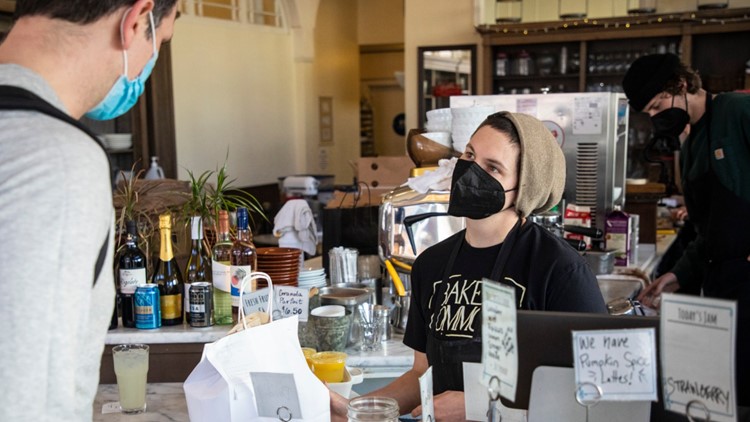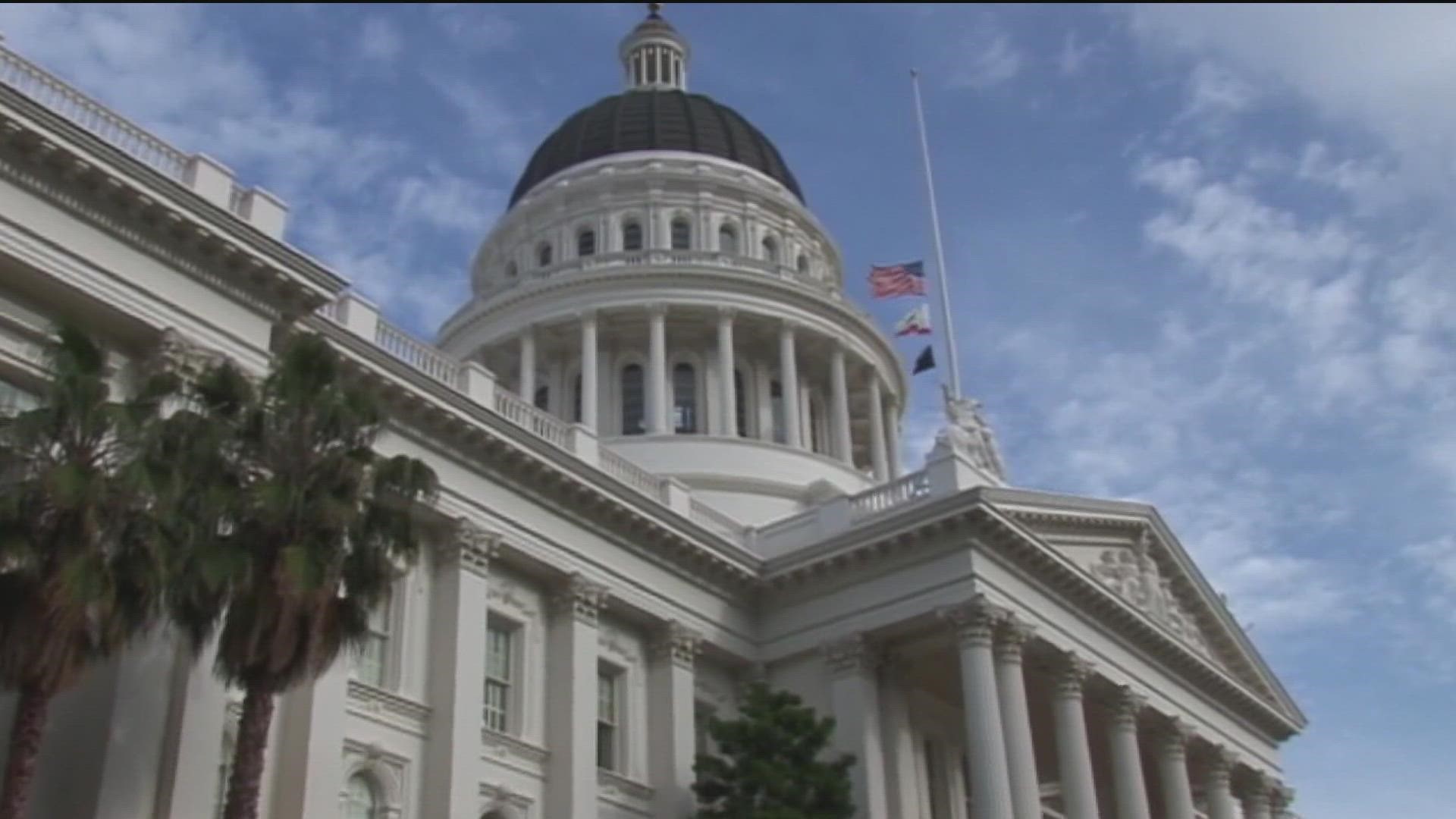CALIFORNIA, USA — A new cough. The beginnings of a fever. A note from your boss about a COVID case at work.
As omicron ripples across California, workers are learning they’ve been exposed and coming down with symptoms. What happens next? There are rules employers and workers are supposed to follow to keep workplaces safe and limit the spread of the virus.
Most California workers who are working in person are covered by emergency temporary rules from the Division of Occupational Safety and Health, better known as Cal/OSHA. A subsection of workers, including some in health facilities, correctional facilities, homeless shelters, and drug treatment centers, are protected by different workplace rules.
Here are the answers to some questions Californians might have about their rights in the workplace during the pandemic.
Can I get time off to get tested?
Sort of.
If you get exposed to COVID at work, your employer is generally required by Cal/OHSHA’s covid workplace rules to provide you with testing, at no cost, during paid time, unless you’ve recently recovered from COVID.
If your exposure is from outside of work, your employer is still required to provide testing at no cost to you, during paid time, if doing so would allow you to remain at work or return to work earlier under public health guidelines for isolatiolation and quarantine, said Erika Monterroza, a spokesperson for the state Department of Industrial Relations.
Unvaccinated, symptomatic workers must be provided with tests by their employer, at no cost to themselves, during paid time, regardless of whether there is a known exposure.
Can my boss make me come to work if there’s a COVID outbreak at my workplace?
It depends.
If an outbreak happens at work, employers are generally required to immediately make testing available to workers who may have been exposed, at no cost to the workers. If you test positive, your employer is required to send you home with pay, and you should only return to work once you meet public health guidance for ending isolation.
If you were exposed but don’t immediately test positive, whether or not you get sent home from work depends on which category you fall into in the state public health department’s isolation and quarantine guidance.
If there’s an outbreak but you weren’t exposed — say, for example, you work in a different building than the people who have COVID — Cal/OSHA’s COVID workplace rules don’t prevent your boss from insisting you work in person, said Monterroza.
During outbreaks, employers are required to offer increased testing.
Do I need a mask at work? Do patrons? Who enforces the masking rules?
Yes, workers must wear masks while working indoors, under a statewide mask mandate that went into effect in mid December.
There are some exceptions, like for workers who are in a room by themselves, workers with a medical condition that prevents them from wearing a mask, and for when workers are actively eating or drinking.
Employers are responsible for ensuring their employees follow workplace mask rules.
There are other ways for workers to address workplace safety issues, including mask usage. Workers are entitled to band together to raise a labor issue with their employer, said Stephen Knight, executive director of Worksafe, a statewide occupational safety organization.
“Anything you do to raise a labor issue with your employer together with other colleagues at work is protected activity under federal law,” Knight said, adding that it is safer for workers to raise issues collectively than to do so alone.
The statewide mask mandate extends to all indoor public settings, so customers coming into stores or gyms, for example, have to wear masks. Local law enforcement agencies are responsible for enforcing mask rules for customers, Monterroza said.
If I get COVID, do I get additional sick leave?
Probably not.
Individual employers may opt to offer supplemental sick leave for COVID. Some localities require that companies provide supplemental COVID sick leave, said Hannah Sweiss, an attorney who counsels employers on how to comply with workplace COVID rules. The city of Los Angeles, for example, requires large employers to offer extra sick leave.
But there’s currently no statewide requirement that employers offer extra sick leave for COVID.
There was a statewide requirement that companies with more than 25 employees offer as much as 80 hours of supplemental sick leave related to COVID-19, but it expired in September of 2021. Legislators and the Newsom administration are currently negotiating over bringing back extra paid sick leave for COVID, with the goal of an agreement in the next several weeks.
Again, if you get COVID from a work-related exposure, your employer is required to send you home, with pay. If your employer provides sick leave beyond the three days required by law, it can require you to use those additional sick days while you quarantine or recover.
However, you can’t be asked to use your three sick days to cover time out after a workplace exposure to COVID. Unless you are already receiving disability or workers’ compensation for the time you’re out after a workplace exposure, your employer is typically on the hook for paying you until you meet public health guidelines to return to work.
If you have to quarantine due to a COVID exposure or case that you’re sure isn’t work related, you can use any existing sick days you have. Beyond that, your employer isn’t required to pay you for that time. However, you may be eligible for other benefits, such as disability insurance.
With omicron spreading rapidly, it isn’t always clear if a worker was exposed to COVID from work or outside of work, said Mitch Steiger, senior legislative advocate with the California Labor Federation. Workers could think they got it off the job when they actually got it on the job, said Steiger, so workers may want to consider the possibility that their exposure was occupational.
Worker advocates are quick to point out that public health guidance telling COVID-positive workers to stay home for five days, while the state only requires employers to give three paid sick days, puts some workers in an impossible situation.
“We are muscling our way through a pandemic without sick leave,” said Knight. “It needs to be changed, and I don’t know what the people can do but call the governor.”
Can I get workers’ compensation if I get COVID at work?
Yes.
Employees who believe they contracted COVID at work should file a workers’ compensation claim, said Monterroza.
Workers’ compensation covers things like medical care, temporary disability payments if you lose wages because of COVID, and permanent disability payments if you don’t recover completely.
It’s pretty straightforward for a worker to start the process of getting workers’ compensation, said Steiger. Once a worker reports having suffered an occupational illness, the employer is required to give the employee a form to fill out to start the process. The Department of Industrial Relations has a guide for workers about how the process works.
Steiger cautions that the process can move slowly, so employees should get it started as early as possible, and also consider whether they should be paid for time out from work under Cal/OSHA’s COVID workplace rules.
A California law passed in 2020 made it easier for first responders and health care workers, as well as workers at a worksite that has COVID outbreak, to access workers’ compensation, by building in a presumption that if these workers get sick it’s due to exposure at work. The burden is on employers to prove the illness did not occur at work.
Can my employer change my job while I’m sick with COVID or quarantining?
If you’re quarantining or sick with COVID because you were exposed at work, and you’re not currently receiving disability or workers’ compensation payments, your employer is required to maintain your pay, benefits, seniority, jobs status, and all other employee rights.
If you are quarantining or sick with COVID that your employer can show is not work related, your employer is not required to maintain your pay or benefits under Cal/OSHA’s COVID workplace rules. However, you may be eligible for other benefits.
Employers aren’t supposed to disincentivize employees from reporting COVID exposures, said labor lawyer Ilana Morady.
If your boss fires you, or retaliates against you for following public health guidance after an exposure or positive test, your boss could be violating rules that require employers to ask employees to report COVID-19 symptoms and possible close contacts to their employer without fear of reprisal, said Morady.
WATCH RELATED: Essential workers calling for paid COVID leave as cases surge



